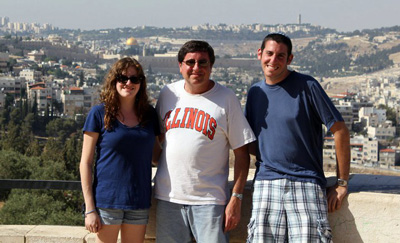My Religious High-Wire Act
Permanent link
I'll never forget my first Shabbat at home after spending five months in Jerusalem studying Judaism at the Pardes Institute. I had spent my entire life in the northern suburb of Deerfield before going away to college, yet I came back feeling like a stranger in my home town.
I picked a synagogue within walking distance of my house, one with a parking lot full of cars and a microphone on the bimah (stage). These things never fazed me the last 22 years of my existence, but they weren't what I had been used to in Jerusalem. There was a big difference walking past buildings made of golden Jerusalem stone to get to shul each week, compared to navigating around Lexuses and Land Rovers.
Clearly I was not prepared for just how difficult my first Shabbat as an observant Jew would be.
I wore my tallit out of the synagogue one humid summer afternoon and walked down the shoulder of a major road. Instead of the typical "Shabbat shalom" greeting I'd get walking the streets in Jerusalem, drivers pointed and stared at me with looks of confusion and amusement as they drove by. The whole walk back I wondered what the hell I was thinking when I made this permanent change in my life.

A family visit during my time living in Jerusalem
When I was getting ready to leave Israel, a friend suggested I pick up Rabbi Joseph Soloveitchik's Lonely Man of Faith, a book about the struggle that comes with trying to be a spiritual person in a physical society. Needless to say, the book has been apropos of the last five years of my life, and today that struggle includes not only my relationship with myself, but also those around me.
When you're studying in Israel, you spend your day learning about the laws and customs and reading commentaries on the Torah until you feel like your eyes will fall out. It results in an infatuation with what you're learning, and as part of that natural progression, you often become more religious. But that didn't prepare me for what I would call the "wear and tear" of my observance.
On a spiritual level, there were many times when my life in Chicago's Jewish community felt like my walks to and from the synagogue in Deerfield -- lonely and full of doubt.
At first, I thought I could gracefully say goodbye to Chipotle veggie bowls, pray on a daily basis and wear a kippah at all times. And there were times I could. But over the years, the sailing of observance has proven anything but smooth.
There is no law in Jewish texts, for example, explaining what to do when your company orders lunch for the office every day and the only kosher option available has lousy service. Nor does it tell you what to do when asked why you can't break Shabbat, no matter what it is you're missing out on. I wasn't prepared for attracting unwanted attention, or offending those who matter most to me, so I punted on the aspects of Judaism that I knew I'd want to take on eventually, but couldn't presently do on my own. Instead of working on my growth, my priorities shifted to doing what was convenient and keeping my ambition under wraps.
A lot of this had to do with the reality I faced in terms of dating. The already small Jewish dating pool was even smaller now. Despite moving into the city to be part of a more religious community and improve my odds, it felt like within a few months I had I met every single Shomer Shabbat Jewish girl in Lakeview. When I started to put myself out there, the "non-negotiables" I promised to look for on dates suddenly became flexible.
Worse, I often had to defend myself for believing what I believe. When out on a date or meeting someone new, I often said I went to dinner at a friend's on Friday night and hung out with friends on Saturday, instead of just mentioning Shabbat. Although it was an accurate description, it felt inauthentic to the meaning behind what I was doing. Spending Shabbat afternoon eating lunch, playing board games and going on walks is more meaningful than just hanging out. It's immersing yourself in an entire community for 25 hours in a shared spiritual experience that is incomparable to anything else.
And now I find myself in New York, a city where I can practice however I want without feeling guilty about it, or lonely.
I have been here just a couple short months, but there's already been a big difference. When my company learned about my Shabbat observance, the CEO followed up and asked me about my level of kashrut so that the company could accommodate me during company meals. I've never heard such a nuanced question from a non-Jewish person I've worked for. Overall, non-Jews have a better understanding of Judaism in New York than Chicago, but it wasn't until I saw this for myself that I fully realized the difference.
You would think this would make the transition to taking the next step easy, but it's not. While physically I live in New York, in my mind, I'm still in Chicago. Five years of a certain feeling or experience do not go away just because you change your home address.
It took me about a month before I was fully able to utter the phrase Shomer Shabbat, even to other people who are equally or more religious than me -- even in New York. While it's technically easier to be religious here, a part of me still feels tepid about it. The line I walk might no longer from the high wire-act I used to perform, but the muscle memory from that act is still there. Over time, I hope it is easier to balance.
For more stories in the "Single, Jewish and Figuring It Out" series, visit oychicago.com/single.



.jpg)



